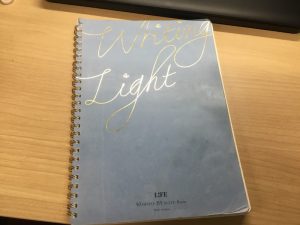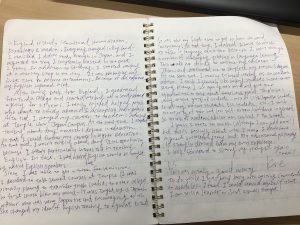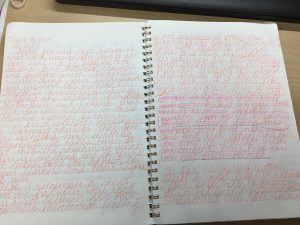Kie Yamamoto, Kanda University of International Studies, Japan
Yamamoto, K. (2018). The journey of ‘becoming’ a learning advisor: A reflection on my first-year experience. Relay Journal, 1(1), 108-112. https://doi.org/10.37237/relay/010110
Download paginated PDF version
*This page reflects the original version of this document. Please see PDF for most recent and updated version.
I am now finishing up my third year as a learning advisor. Three years is not long; however, looking back at my own professional development, the pathway of “becoming” was full of discoveries and challenges. While I had a clear idea of what a learning advisor does from the literature, being one was fairly different from what I had imagined.
The principle of advising in language learning concerns learner reflection as a crucial aspect in learner development. Simultaneously, I found that becoming a learning advisor also requires constant reflection on my own advising practice as well as my beliefs (such as my educational philosophy), which stem from my own learning experience. This year, I had the opportunity to meet colleagues who had just started advising training. The communication with new advisors was refreshing; indeed, it encouraged me to reflect on my first year experience and tell my own story about “becoming” a learning advisor. To do this, I will share a piece of autobiographical writing based on a series of shared journal entries that I compiled with my mentor.
Becoming a ‘Perfect Learning Advisor’
In my first year as a learning advisor, I was assigned a mentor, who had substantial advising experience in my institution. As a part of our mentorship, we decided to share journals. Although we were sharing an office, I thought writing might be a good way to reflect on my own practice in depth, and to be honest about what I was feeling. Rather than making it a scheduled routine, we decided to share our thoughts in writing whenever we felt like it. While I was not entirely sure what to write in the journal, my mentor started off by writing about her educational background to explain how she came to become a learning advisor. She was describing her first English teaching experience with a female immigrant, which encouraged her to pursue a TESOL degree. Each piece of her story helped me understand who she is. At the end of her first journal entry, she wrote a question; “What would you like to share with me?” I remember that I responded to her as soon as I finished reading her entry. I imagine my hurry was due to my willingness to be understood where I came from as well.
Reflecting on Where I Came From
In my first journal, I mainly wrote about my own language learning experience as well as my experience in advising. Describing how I had struggled with finding a reason to study English, I shared my own study abroad experience and wrote, “I guess I felt something needed to be changed”. When I was junior at college, I decided to study in England. The experience, according to the journal, changed “everything” and “it was probably my first time to become autonomous”. Another learning experience I shared in the journal was an encounter with a Japanese professor who inspired me to become a teacher of English. “The first course (on a TESOL program) blew my mind-it was taught by a Japanese professor who was very supportive and encouraging to us. She changed my idea of English teaching to a great extent.” Without her, I wouldn’t have been inspired to choose a career that allows me to support English language learners. I also wrote about my experience with helping a diversified group of students at an American university while working as an academic advisor. “I think I genuinely like helping students in one-to-one setting because I can open up their mind and give them opportunities to think about themselves and grow”. In total, I wrote three pages for my first entry. Reading it through again , I can see the foundation of my advising philosophy stems from those experiences.


Reflecting on my Emotion in Advising Practice
Rereading my journals, my old self as a new learning advisor seemed to be experiencing a number of challenges in everyday advising practice – I was overwhelmed by engaging in individual advising sessions, I was upset about students who stopped coming to see me, and I felt pressured by my colleagues who do a great job as researcher-practitioners. Before starting my current career, I had confidence in my advising skill to a certain extent; unlike other learning advisors, my entire career was based on working with individual students in education. I was also positive that I would become a good advisor. However, I lost the positive image of myself throughout various advising training sessions. Although I had substantial advising experience prior to my current career, the concept of advising seemed fairly different from what I believed as advising; my belief about advising was leading students to “successful” academic pathways. Thus, I had a strong belief that knowledge building was the most crucial aspect of professional development for advisors. On the other hand, what I often heard from experienced advisors was about taking an indirective approach to encourage learner reflection in advising session. I was stuck in a dilemma between two opposing ideas; moreover, looking back, I was worried if I could successfully reform my entire advising approach into a more reflective one as other experienced advisors did.
Reflecting in Interaction: Shaping my Identity as a Learning Advisor
Continuing along with this winding road, the shared journal with my mentor was a good place for me to reflect on those feelings in everyday advising practice. Not only jotting down my own thoughts, but my mentor’s comments and questions also allowed me to focus on the axis of my advising philosophy; willingness to help. When a list of advising skills is presented, the majority of advisors (I believe) strive to acquire all of them quickly in order to be a good advisor. As my inspiring senior colleague, Satoko Kato always mentions, the first stage of an advisor education programme involves a great deal of conscious reform in advisor talk. As I discovered, this conscious talk can be overwhelming as deciding which skill(s) would be appropriate, what kind of questions should follow, and how a question should be asked can be a lot to take on at once. For the first couple of months, I felt my talk was very unnatural. I was also seriously concerned if this unnatural conversation would have given students an impression that I was a novice advisor. “Am I serving as a good advisor?” was a question that frequently came up in my journal. My mentor, in her response, indirectly and repeatedly highlighted the importance of our role. “Advising is not about us, it is about a student”, “we have to be a mirror”, “We desire to help learners”. These comments helped me stay focused on why I chose to pursue this career, while shaping my identity as a learning advisor.

Final Thoughts: Still in the Process of ‘Becoming’
By telling the story of my own first year experience, I strongly feel that this has become a locus of my advising philosophy. Becoming a learning advisor does not merely entail skill acquisition; rather, the process of “becoming” constantly challenges our beliefs, including our values, our educational philosophies and our own language learning experiences. I believe this is the most crucial aspect of our professional development. In my case, as I was already in the field of advising prior to my current career, revisiting my own beliefs, as well as experience, it was truly helpful to ask myself what kind of learning advisor I was aiming to become. Instead of sticking to my previous advising experience, I was able to develop multifaceted advising approaches that enabled me to engage in advising without biases. Simultaneously, the constant reflection with my mentor throughout my first year was the biggest help in becoming a learning advisor. Because the majority of advising training requires advisors to control their speech acts as well as their emotions while engaging in an advising session, I believe reflecting with others, especially experienced advisors, is essential. As I have described, I faced several rough spots mainly in the early stages of my first year by comparing myself with other learning advisors and losing confidence in my own advising skills. It was my mentor that always encouraged me to stay focused on why I am here without losing my willingness to help learners. This mindset has not changed after three years have passed. As I call it “a journey”, professional development as a learning advisor is ongoing. Although I am now used to my role, each advising session is full of new discoveries.
Advising in language learning is still an emerging field; thus, it is my belief that disseminating our experiences will become a key tenet in establishing a community of learning advisors where each of them openly shares and discusses their advising practice. It is my hope that this piece of my own story will encourage other members of the community to reflect on their journey of “becoming” a learning advisor.
Notes on the contributor
Kie Yamamoto is a learning advisor at Kanda University of International Studies. She holds an M.S.Ed from Temple University Japan, and is currently pursuing an Ed.D at the University of Bath in the UK. Her research interests are language learner identity, second language socialization, advising discourse, and narrative analysis.

Kie,
I am so moved by this account of your ‘becoming’ a learning advisor. I was there for much of the process, and it was my pleasure as your mentor to assist you as I was assisted by all who mentored me in my ‘becoming’. I want to share some of my thoughts based on my own experiences with you and this community.
My favorite part of your writing was this:
“Becoming a learning advisor does not merely entail skill acquisition; rather, the process of “becoming” constantly challenges our beliefs, including our values, our educational philosophies and our own language learning experiences.”
‘Becoming’ does challenge us to examine ourselves. It was difficult for me at the beginning of my journey to ‘becoming’ as well because I had to learn a new way of being with students. Like many new advisors, I was concerned about being the best advisor I could be because I thought that was the best way to help students and the best way to accomplish this was through developing my advising skills. A senior advisor told me about different ways in which learning advisors advised and it helped me see that all advisors approach it in different ways. I have since learned the importance of being me. Yes, I use advising skills but the way I use them is all Liz. Thus, my journey to ‘becoming’ has been one of discovery of myself and my beliefs about learning and life. I believe it is important to be present and mindful of the impact my actions in sessions and outside of them have on students and myself. Recently, I have returned to reading about mindsets and I was struck by the growth mindset and how it might apply to advising. It is through attempts at growth, at stretching, the process, that ‘aha’ moments occur. When I see the light of understanding appear across a student’s face, I know we have gotten there. I respect that language learning is a very sensitive process, and I believe that learning advisors can help guide students towards an understanding of themselves as language users. I would not have learned this had I not become an advisor.
As you also mentioned, there are times when I have struggled to feel good about my advising because I worried if I did enough for students in advising sessions. It was at these times that talking with other advisors about how I was feeling and why I felt that way helped me to discover something different about the experience. Learning advisors have to support one another. We have to be open about sharing our experience, not only because the field is still relatively new, we owe it to the field of language education show how we explore other means of assisting students in their language learning development. In the 6.5 years I have spent advising, I have been able to track my growth from year to year through personal reflection as well as reflection practices with other advisors. It helps when other advisors are able to be a mirror for you so you can confront aspects of yourself and your advising you never noticed before.
As lovely as advising is, it can be very challenging. It takes so much energy to be present with students and ourselves. Students at KUIS have a tremendous amount of contact with learning advisors through booked and drop-in advising sessions, classes or in impromptu visits to the self-access learning center. Depending on the context in which other learning advisors work, this might also be the case. I have found that making time for professional development and personal development is vital to my well being. I think that in ‘becoming’ an advisor, it was vital for me to not lose a sense of self. Taking care of myself outside of advising helped me when I had to manage my emotions in sessions that were particularly difficult or when I was dealing with something personal outside of work. Education is full of givers but we have to recharge emotionally, mentally and physically as well.
Finally, Kie, your writing is a wonderfully reflective as it encourages learning advisors to reflect on their ‘becoming’. It has certainly helped me to reflect back on my development as an advisor. I would love to see more responses to your story. I’d like to know: how has your reflection on your advising practice helped you with advising students on their language learning practices?
Dear Liz,
Thank you very much for your comment-I feel like re-starting our journal again! I am certain that the readers of this article can tell how much your comments have been powerful in our mentorship.
Reflection on my advising practice helps me stay on point in any moment of an advising session; it is not about me, it is for the student sitting right in front of me. Being aware of my own beliefs is crucial while engaging in an advising session because it could strongly influence how a learner makes decision on his/her learning. Although I miss you terribly, fortunately, my colleagues are always openly willing to reflect on our practice with each other. As you mentioned, openness among learning advisors is inevitable to keep exploring every possible form of support for learners. Like we do in our professional development in the SALC, I believe it is important to take a moment to reflect on our practice periodically.
Kie,
I understand that our beliefs about language learning have a powerful effect on how we advise students in this area. It’s difficult to hold back when advisors have a different belief about language learning than their advisees. As we’ve mentioned, one of the ways that we reflect on our practice is through discussions with other learning advisors who often either consciously or unconsciously use advising skills to help us to reflect more deeply about the experience we want to share. I have been thinking more about how I have actively used those discussions to further my practice. Often I have recalled discussions with my colleagues regarding a specific advising technique or I have challenged myself to try a new skill if applicable in my advising sessions, yet thinking about advising training and mentoring, I think it is also important to help advisors become aware of themselves as advisors. For example, how are we managing our emotions in dealing with students who need our help but make us feel uncomfortable? Learning how to be in tune with our emotions and how we are respond to students because of those emotions would be another good step in ‘becoming’. Remember the exercise we tried where we asked advisees for permission to video record the session so we could examine our body language and our dialogue? It was a challenge to watch it because I felt very exposed. I found it more revealing than listening to recordings. Advising sessions tend to be one-on-one and private. However, I found that in reviewing the recording almost immediately after the session, I could pinpoint areas in the session where I was not only using advising skills, but I was also showing emotion and it was interesting to see how the advisee reacted to me. I am quite curious about how students respond to what they perceive their advisor’s emotion to be and what effect if any it has on the advisee in the session.